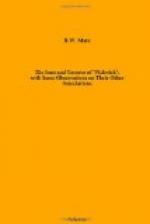The Royal Hotel to which Mr. Winkle resorted, after his adventure with the valorous Dowler, for the purpose of escape to Bristol by the branch coach, probably never existed—at any rate, by that name. Dickens may have had the “York House” in his mind, for he stayed there himself on one occasion, and it was one of those ornate hotels, accustomed to receiving royal and distinguished visitors, suggesting such a title as Dickens gave it.
There is, however, a tavern in Bath which claimed—or was made to claim—a Pickwickian association, and that is the Beaufort Arms. The story in connection with it is that before it was a tavern it was originally “the small greengrocer’s shop” over which the Bath footmen held their social evenings, and was, therefore, the scene of the memorable “leg o’ mutton swarry,” given in honour of Sam Weller. This may be so; we prefer to think that it was more likely to have been the public-house from which, as we are told, drinks were fetched for that dignified function.
The “Saracen’s Head” in the same city has a Dickensian, if not a Pickwickian, interest, for Dickens stayed there when, in his journalistic days, he was following Lord John Russell through the country in 1835, reporting his speeches. We can be sure that it was during this brief visit that he gained an insight into the social doings and customs of the city, and also gathered the extensive knowledge of its topography his book exhibits. The “Saracen’s Head” is proud of its Dickens associations; the actual chair he sat in, the actual jug he drank from, and the actual room he slept in are each shown with much ado to visitors; whilst several anecdotes associated with the novelist’s visit on the occasion are re-told with perfect assurance of their truth.
Arriving at Bristol after his flight from Mr. Dowler at Bath, Mr. Winkle took up his quarters at the “Bush,” there only to encounter later in the day “the figure of the vindictive and sanguinary Dowler” himself. Explanations soon smoothed over their little differences, and they parted for the night “with many protestations of eternal friendship.”
[illustration: The “Bush,” Bristol. From an engraving]
In the meantime, Sam Weller had been sent posthaste on Mr. Winkle’s heels with instructions from Mr. Pickwick to lock him in his bedroom as soon as he found him. Sam was nothing loath, and when he had run Winkle to earth at the “Bush”, promptly carried out his master’s orders and awaited his further instructions as to what to do next. These were brought next morning by Mr. Pickwick, in person, when he walked into the coffee-loom. Satisfaction being arrived at, the three stayed on at the “Bush” for a day or two, experiencing some curious adventures in the neighbourhood during the time.
On another occasion Mr. Pickwick and Sam stayed at the “Bush,” and after dinner the former adjourned to the travellers’ room, where, Sam informed him, “there was only a gentleman with one eye, and the landlord, who were drinking a bowl of bishop together.”




